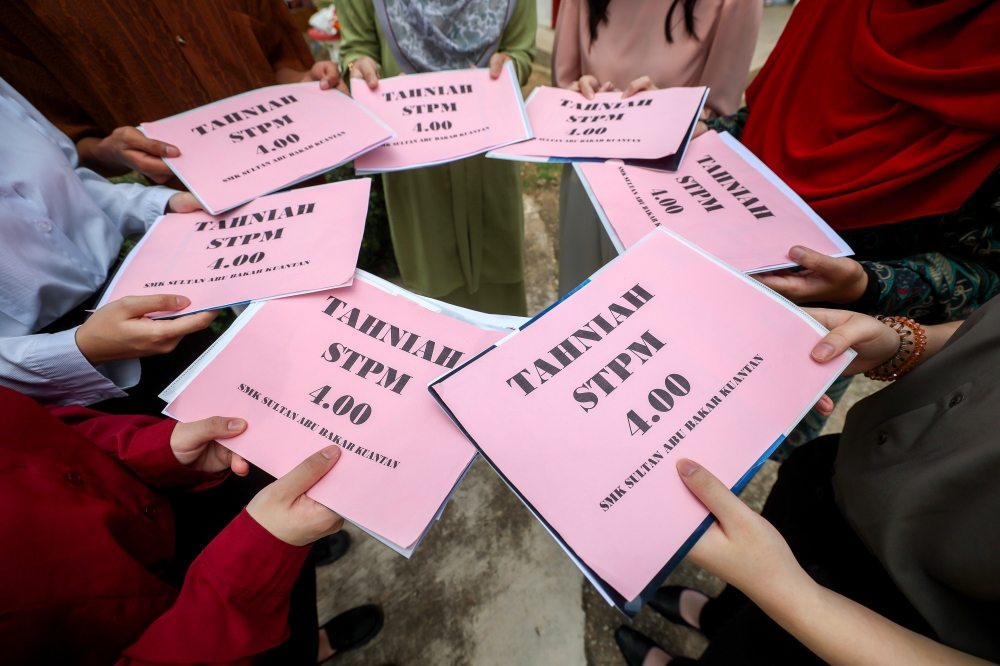JUNE 30 — Every year, thousands of Malaysian students sit for their SPM exams. And every year, graduates are given a plethora of options post-SPM. Some choose to take A-levels, international baccalaureate, AUSMAT or others. Some begin working.
Others, who opt for public higher education, are sorted, by choice or by circumstance into one of several public pre-university pathways: STPM, matriculation, or Asasi (foundation). In theory, all three aim to prepare students for the same thing: a place in a public university.
But in reality, the system isn’t just disjointed. It’s deeply unfair. When it comes to the UPU system, Malaysia’s centralised public university intake, all CGPAs are treated as equal.
A 4.0 from STPM is viewed the same as a 4.0 from Matrikulasi or Asasi.
On paper, that may sound efficient. In practice, it erases a crucial truth: not all pre-U tracks are created equal.
Let’s not kid ourselves. STPM is objectively the most academically rigorous of the three. Spanning 18 months, with a curriculum benchmarked against international standards, STPM students face national-level exams, external assessments, and grading that is anything but lenient.
Perfect scores are rare, not because these students lack ability, but because the bar is incredibly high.
Meanwhile, Matrikulasi and Asasi programmes, both governed internally by the Ministry of Education or individual universities, have consistently produced far more students with a perfect 4.0.
That gap in academic difficulty is not something we should gloss over. It matters. And ignoring it in the UPU selection process is not just bad policy, it’s a quiet betrayal of the very idea of meritocracy.

The authors say Malaysia needs a single nationalised pre-U standard: one that treats students equally, regardless of where they studied. — Bernama pic
If fairness is what we claim to uphold, then it’s time for transparency. The Ministry of Higher Education should release, publicly, the annual breakdown of how many students achieve 4.0 CGPAs in each stream.
The data will allow us to confront what many students and educators have known for years: we have a system that punishes those who choose the harder path.
Let’s be clear: this is not about dismantling Matrikulasi or Asasi. They serve a purpose, and an important one.
As a Matrikulasi alumna ourselves, we will be the first to say it provided us with structure, financial support, and a safe, focused learning environment.
For students from low-income families, it’s a lifeline. For some, it’s the first real chance they’ve had to focus solely on education.
But the issue isn’t the existence of these programmes. It’s that we have three separate systems, with different standards, all feeding into the same university pipeline without any harmonisation.
Moving forward, what we need is to standardise the syllabus, unify the assessments, and calibrate the grading.
Essentially, Malaysia needs a single nationalised pre-U standard: one that treats students equally, regardless of where they studied.
Much like the SAT in the US or the gaokao in China, we need to create a system that is consistent, credible, and transparent.
Only then can we say, honestly, that this country values merit.
The longer we avoid this conversation, the more credibility we lose as a country that claims to uphold both excellence and equity.
If we don’t fix this, we’ll keep repeating the same debates: who deserves to enter Matrikulasi, who got left out of medicine, who was “unfairly” denied a spot in law school.
We cannot put the blame on brain drain when we do not create a safe environment for quality minds to develop and thrive in this country.
This is more than education policy. It’s about rebuilding trust in public institutions. It’s about giving our youth across all races, income levels, and regions a system they can believe in.
We cannot build a future on uneven ground.
We cannot keep gaslighting our students into thinking this system is fair when so many of them know it’s not.
And we cannot afford to lose our brightest minds to broken processes and quiet injustices.
We owe them better. And we owe this country a future built not on bureaucracy, but on actual, meaningful merit.
* Vanessa Scully & Dr Sean Thum are co-chairs of a youth non-governmental organisation (NGO) called Vokal Sejiwa. Aside from that, Scully is a criminal lawyer and Thum is a policy officer in the Ministry of Communications.
** This is the personal opinion of the writer or publication and does not necessarily represent the views of Malay Mail.






